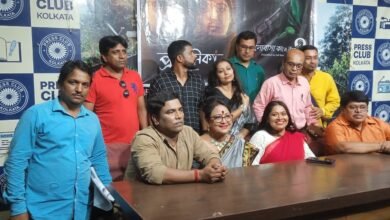
About the Academy catering Naatu Naatu’s Oscar win to the Indian market

In a conversation over the concept of faith in Life of Pi, Ang Lee’s seminal, Academy Award-winning film, the adult Pi Patel (played to perfection by Irrfan) says to a writer interviewing him, “Doubt is useful, it keeps faith a living thing. After all, you cannot know the strength of your faith until it is tested”.
The Academy and the West have shown immense faith in ‘Naatu Naatu’, the vigorous song and dance centrepiece in SS Rajamouli’s anti-colonial part-mythology-part-history action drama, RRR, that made history on Monday by bringing the coveted golden statue home, becoming the first Indian song and second Indian language-song to win the Oscars. Everything and everyone looked lovely – Deepika Padukone, her blushing invite for the performance of the song “that’s also a banger”, followed by the high-octane dance performance; M M Keeravani crooning his speechas the famed Carpenters’ song, ‘Top of the World’, and a very fond reception from Hollywood and the Academy.
It is a significant moment – not only because it has put Indian regional cinema, which is not Bollywood under the spotlight but also because it gives Keeravani the accolades he deserved after years of hard work. The award has also managed to create a crack in the wall that seemed impenetrable for many years for homegrown musicians. Composer A R Rahman is the only one who made it to the other side – however, he did so through a foreign venture. If with Rahman’s ‘Jai ho’, one thought that Indian music could win an Oscar, ‘Naatu Naatu’ is a crucial turning point, a reminder that even an entirely Indian production can make it to the pinnacle.
But in the interest of fairness, it is important to set the record straight. With time, it will likely be realised that Naatu Naatu’s win for a couple of very well-written and beautifully performed songs was riding on the popular mood of the time. There are hundreds of songs like ‘Naatu Naatu’ in India – with a hook, an elementary tune and heavily percussive and gritty rhythms – taken from the world of the street folk form of Kuthu. Remember ‘Naak Mukka’ or ‘Aappdi Podu’ or Rahman’s ‘Verithanam’ or ‘Soddakku by Anirudh? ‘Naatu Naatu’ feels a notch better because its dance-off is like a significant fight sequence in the film that moves the plot forward, one of the many ideas significant to the award. But musically, it’s unexceptional, even compared to many of the aforementioned pieces.
I also wonder, since when has the popularity of a hook step, and people fawning over a song affected the decision-making of the Academy? Ideally, it shouldn’t. But there is no doubt that there have been many lapses of judgement. It did not include ‘Carolina’, the lovely Taylor Swift number from When the Crawdads Sing, this year. In the past, it did not nominate any song from the phenomenal Inside Llewyn Davis (2013). But then it also didn’t pay any attention to one of Liza Minelli’s best-known pieces, ‘New York, New York’ (1977). Shockingly, even ‘Stayin’ Alive’ by the Bee Gees from Saturday Night Fever (1977) didn’t make the cut, neither have some of the most beautiful music from India including from Satyajit Ray films, or in Mother India or Lagaan, two films that did find nominations in other categories. Even some of Keeravani’s own music in Hindi and Telugu cinema is more capable of jousting in the competition.
One feels that the nomination and win is an attempt to pander to the Indian market. The Academy, like any other organistion, need sponsors and advertising needs viewers. Viewership comes from one of the largest countries in the world which, unlike China, does not have any internet restrictions. The more Indian curry one is going to serve, the more Indians are going to flock, and many global sponsors who either have or want to have businesses in India are likely to be interested. With the popular wave about the song in place too, the win, somewhere, feels like catering to “brand India” rather than RRR.







